Unit 4 Don’t eat in class. Section A 2d-GrammarFocus 课件
文档属性
| 名称 | Unit 4 Don’t eat in class. Section A 2d-GrammarFocus 课件 | 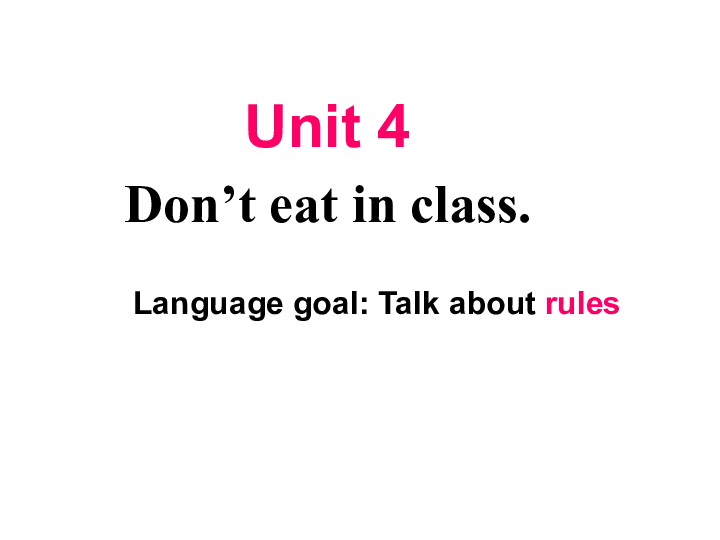 | |
| 格式 | zip | ||
| 文件大小 | 9.4MB | ||
| 资源类型 | 教案 | ||
| 版本资源 | 人教新目标(Go for it)版 | ||
| 科目 | 英语 | ||
| 更新时间 | 2017-03-22 20:51:07 | ||
图片预览

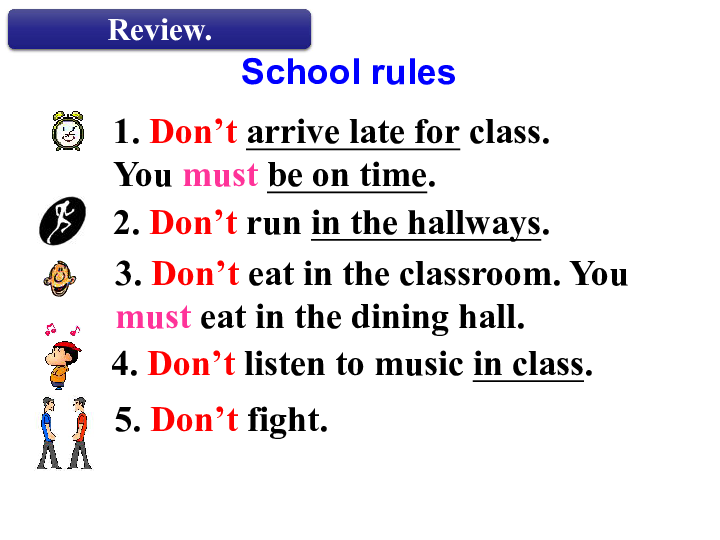
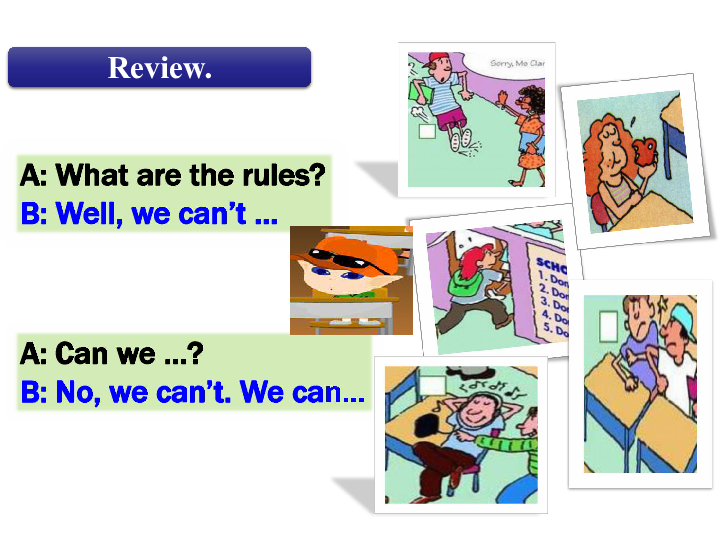
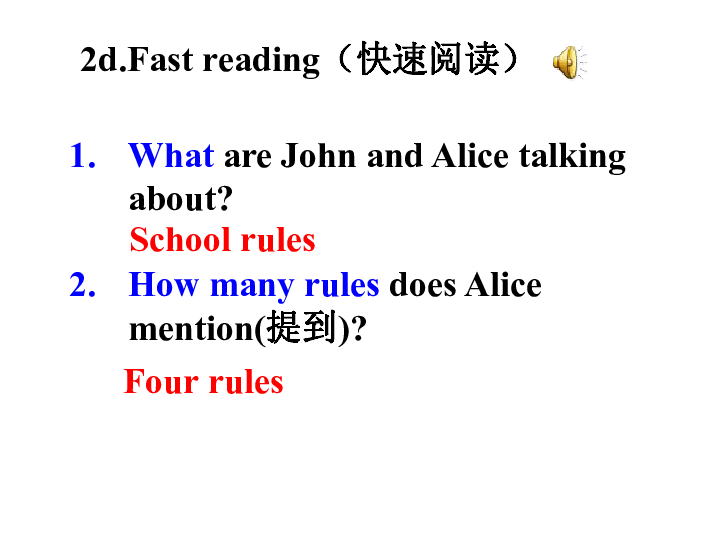
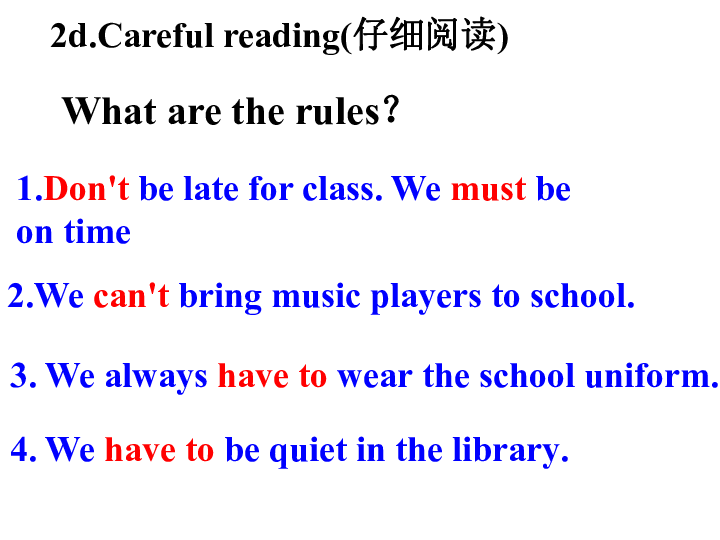
文档简介
课件67张PPT。Unit 4
Don’t eat in class.Language goal: Talk about rulesSchool rules1. Don’t arrive late for class. You must be on time.2. Don’t run in the hallways.3. Don’t eat in the classroom. You must eat in the dining hall.4. Don’t listen to music in class.5. Don’t fight.Review.A: What are the rules?
B: Well, we can’t … A: Can we …?
B: No, we can’t. We can…Review.2d.Fast reading(快速阅读)What are John and Alice talking about?
How many rules does Alice mention(提到)? School rulesFour rules2d.Careful reading(仔细阅读)What are the rules?1.Don't be late for class. We must be on time2.We can't bring music players to school.3. We always have to wear the school uniform.4. We have to be quiet in the library.John: Hi, my name’s John. It’s my first day at school.
Alice: Hi, John. I’m Alice. This is a great school, but there are a lot of rules.
John: Really? What are some of the rules?
Alice: Well, don’t be late for class. This is very important.
John: OK, so we must be on time. Can we bring music players to school?
Alice: No, we can’t. And we always have to wear the school uniform.
John: I see.
Alice: Oh, and we also have to be quiet in the library.2d.Role-play the conversation.1.be late for =arrive late for“迟到”
Eg: He is always late for school.
=He always arrives late for school3.bring“带来”,反义词take“拿走”常用结构:
bring sth to+地点“把某物带到某地来”
bring sb sth=bring sth for sb.“给某人带来某物”2.It is important (for sb) to do sth
“(对某人来说)做某事是重要的”
eg. It is important to learn English well.4.Be动词与形容词或介词短语联用,是英语一种常见的语句结构,表示某种状态。如:
be quiet 保持安静;be late 迟到
be on time 守时; be at work 在上班
这种用法中,动词be主要起着连系句
子的语法功能,其后的形容词或介词短
语则起着表意的作用。如:
At this time, children are at school.
这个时候,孩子们在学校上课呢。
5. 情态动词have?to?的用法:
“必须、不得不”,它侧重于客观上
的必要和被动。后接动词原形,有人称和数的变化。
1) 结构:
肯定句:主语+have?to+动词原形+其他
(主语是第三人称单数时, 用has?to) 如:我们每天必须穿校服
We?have?to?wear?school uniforms?every day.
?汤姆每天必须练习弹吉它。
Tom?has?to?practice?the?guitar?every?day.2) 否定形式:主语+don’t/doesn’t?have?to+动词原形+其他。如:
尼克不必戴帽子。
Nick?doesn’t?have?to?wear?a?hat.
今天我们不必做作业。
We?don’t?have?to?do?our?homework today. 3) 疑问句:
Do?(Does) +主语+have?to?+动词
原形+其他 如:
你必须在餐厅吃饭吗?
Do?you?have?to?eat in the dining hall?
Yes,?I?do.?/?No,?I?don’t.?
他必须打扫房间吗?
Does he have to clean his room?
Yes, he does. / No, he doesn't. 按要求改写句子,每空一词。
1. Paul has to eat outside.
(改为一般疑问句)
_____ Paul _____ ___ eat outside?
2. They can wear hats in the hall.
(改为一般疑问句)
_____ they _____ hats in the hall?
3. The students have to wear the school uniforms. (对划线部分提问)
______ do the students _____ ___ ___?Does have toCan wearWhat have to do4. You can’t listen to music in the hallways. (改为祈使句)
_____ ______ to music in the hallways.
5. Eat in the dining hall. (改为否定句)
______ ______ in the dining hall.
6. Don’t arrive late next time. (改为同义句)
_______ ____ late next time.Don’t beDon’t listenDon’t eat肯定祈使句
Sit down.
Come in.
Eat at home.
否定祈使句
Don’t sit down.
Don’t come in.
Don’t eat at home.祈使句的否定句怎么构成?肯定句呢?一般什么情况下使用祈使句?祈使句是用来表示请求、命令、劝说、警告等的句子, 这类句子的主语常是第二人称you,也就是听话者,但常省略掉。祈使句的开头是动词原形。如:
Look?out!?小心!
Let’s play basketball!?咱们打篮球吧!
Please be quiet!? 请保持安静!Listen to music outside.
Don’t listen to music outside.
Do your homework at school.
Don’t do your homework at school. 祈使句的否定形式多以don’t 开头, 再加上动词原形。找出所有的情态动词1.情态动词在用法上有什么共同特点?
2.can在本单元表示什么意思?它还可以表达什么意思?
3.have to在用法上与其他情态动词有何区别?后都加动词原形在此表示许可,允许; 还可以表示能力有人称和数的变化 情态动词have?to?的用法:
“必须、不得不”,它侧重于客观上
的必要和被动。有人称和数的变化
1) 结构:主语+have/has?to+动词原形+其他
如:我们每天必须穿校服
We?have?to?wear?school uniforms?every day.
?汤姆每天必须练习弹吉它。
Tom?has?to?practice?the?guitar?every?day.2) 否定形式:主语+don’t/doesn’t?have?to+动词原形+其他。如:
尼克不必戴帽子。
Nick?doesn’t?have?to?wear?a?hat.
今天我们不必做作业。
We?don’t?have?to?do?our?homework today. 3) 疑问句:
Do?(Does) +主语+have?to?+动词
原形+其他 如:
你必须在餐厅吃饭吗?
Do?you?have?to?eat in the dining hall?
Yes,?I?do.?/?No,?I?don’t.?
是的, 我必须。 不, 我不必。 Library rules
1. Don’t talk.
2. __________
3. __________
________
4. __________
_______Don’t eat.Write the rules for the school library. 3aDon’t listen to music.Don’t take photos.Use the words to make questions about the rules. Then write answers according to your school.3b1. Be quite?
Q: Does she have to be quite in the library?
(she/have to/in the library)
A: Yes, she does.
2. Eat?
Q: ________________________________
(he/ have to/ in the dining hall)?
A: _________________________________Does he have to eat in the dining hall?No, he doesn’t. He can also eat outside.3. Listen to music?
Q: ________________________________
(we/ can/ in the hallways)?
A: ________________
4. Wear a hat?
Q: _______________________________
(we/ can/ in the classroom)?
A: _______________Can we listen to music in the hallways?Can we wear a hat in the classroom?No, we can’t.No, we can’t.Make up five cool rules for your dream school. Share your rules with the class. Your classmates vote for the Coolest School! 3c1. We can eat in
class.
2. We don’t have to come to school every day.
3. …用所给单词的适当形式填空。
1. Don’t ________(listen) to music in the
library.
2. Does he have to ________(clean) the room
every day?
3. You can’t ________(wear) sunglasses in
the classroom.
4. Please ________(arrive) at school on
time (准时).
5. John is often late for _______ (class).classlistencleanweararrive按要求改写句子,每空一词。
1. Paul has to eat outside.
(改为一般疑问句)
_____ Paul _____ ___ eat outside?
2. They can wear hats in the hall.
(改为一般疑问句)
_____ they _____ hats in the hall?
3. The students have to wear the school uniforms. (对划线部分提问)
______ do the students _____ ___ ___?Does have toCan wearWhat have to do4. You can’t listen to music in the hallways. (改为祈使句)
_____ ______ to music in the hallways.
5. Eat in the dining hall. (改为否定句)
______ ______ in the dining hall.
6. Don’t arrive late next time. (改为同义句)
_______ ____ late next time.Don’t beDon’t listenDon’t eat将下面的句子改为祈使句,每空一词。
1. You can come in.
______ ____, please.
2. I can help you.
_____ me ______ you.
3. You can’t eat in class.
_______ _____ in class.
4. You can’t be late for school.
______ ____ late for school.
5. You can’t take photos here.
____ photos here.Come inLet helpDon’t eatDon’t beNoHomeworkWrite down more rules you know
in your school. (at least 5) PreviewTo preview the new words and expressions
Do you know the rules for the school library?Thank you. play basketball.
Can we play play basketball in class?
No, we can’t.
But we can play it outside. Don’t play sports in class.Look and say.
eat
Can we eat in class?
No, we can’t.
But we can eat in the dining hall. _____eat in class.Don’t
fight
_____we fight?
No, we______. Don’t ______.Cancan’t fight
run in the hallways.
____________in the hallways?
No, __________.Don’t ________________.Can we runwe can’trun in the hallways listen to music in class.
Can we____________________?
___________.__________________in class.Don’t listen to musiclisten to music in classNo, we can’tDon’t eat in the classroom.Don’t play sports in the classroom.Don’t fight.We can eat in the dining hall.We can play sports outside.We can’t fight with others.Don’t sleep in class.Don’t wear a hat
in class.Don’t dance in
class.Don’t run in the
hallways.Don’t listen to music
in class.Don’t talk in class.Don’t arrive late for
class.234567891011What are the rules
at our school?1Language points 1. outside
【例句】
1. We can’t eat in the classroom, but we
can eat outside.
2. Mike is sitting outside the house.
① 作副词,意为“在外面,向外面”,
常单独作状语。如:
Please don’t look outside.
Look at the blackboard.词语链接② 作介词,意为“在……的外面”,后跟
表示地点或处所的名词。如:
They often take a walk outside the school.2. OK, so we must be on time.
对的,所以我们必须守时。
1)must作为情态动词,表示“必须”、“务
必”,有时还表示“一定”,起到加强语
气的作用。如:
You must come tomorrow.
你(们)明天必须来。
She must have this dictionary.
她一定有这本字典。2) on time是一个固定介词短语,表示“按
时;准时”。如:
We must get to school on time.
我们必须按时到校。
Planes and trains don’t always arrive on
time.
火车、飞机并不总是准点到达。
3) 系动词be与形容词或介词短语联用,
是英语一种常见的语句结构,表示某种状态。如: be quiet 保持安静;be late 迟到
be on time 守时; be at work 在上班
这种用法中,动词be主要承担着连系句
子的语法功能,其后的形容词或介词短
语则起着表意的作用。如:
you mustn’t be noisy, children.
孩子们,你们一定不可喧闹。
At this time of the day, children are at
school. 一天中的这个时候,孩子们在
学校上课呢。3. hear, listen和sound都有“听”的意思,
但三者是有区别的。
1) hear “听说”, 侧重于“听”的内容。
I’m?sorry?to?hear?that?you?are?ill.?
听说你生病了, 我很难过。
I?never?heard?such?an?interesting?story.
我从来没听过这么有趣的一个故事。 2) listen“听”侧重于“听”这一动作。Listen?to?me?carefully.?
认真听我说。
The?children?like?to?listen?to?music.?孩子们喜欢听音乐。
3) sound“听起来”,它是系动词, 后面接形容词等。
That?sounds?great. 那听起来真不错。
It?sounds?like?fun.? 听起来挺有趣。4. arrive?late?for?与be?late?for?意思相近,
都表示“迟到”。
Don’t?arrive?/be late?for?school.
上学别迟到。
I?arrived/was late for the meeting
yesterday.
我昨天开会迟到了。- What are the rules at your school?
- Don’t run in the hallways and don’t
arrive late for class.
Don’t listen to music in the
classrooms.
What are the rules?
Well, we can’t eat in the classroom. 课时重点回顾ReviewReviewWords and expressionsrule
arrive
(be) on time
hallway
hall
dining
listen
listen to…
fightn. 规则;规章
v. 到达
准时
n. 走廊; 过道
n. 大厅;礼堂
n. hall 餐厅
v. 听;倾听
听……
v.&n. 打架;战斗Words and expressionssorry
outside
wear
important
bring
uniform
quietadj. 抱歉的;难过的;
惋惜的
adv. 在外面
adj. 外面的
v. 穿;戴
adj. 重要的
v. 带来;取来
n. 校服;制服
adj. 安静的Words and expressionsDon’t ______ late
for class.Don’t ____in the
classroom.eatarriveDon’t______.fightDon’t____________ in class.listen to musicLook and say.
Which rules are these students breaking?Don’t arrive late for class. You must be on time.Don’t run in the hallways.Don’t eat in the classroom. You must eat in the dining hall.Don’t listen to music in class.Don’t fight.School rules1. Don’t arrive late for class. You must be on time.2. Don’t run in the hallways.3. Don’t eat in the classroom. You must eat in the dining hall.4. Don’t listen to music in class.5. Don’t fight.We have to….
We have to arrive school on time.
We have to do homework every day.
We have to clean the classroom every day.
We have to wear the school uniforms every day.What do you have to do at school?-- Do you have to…in the school?
-- Yes, we do. We have to...
/ No, we don’t. We don't have to... wear the school uniforms on weekends
clean the classrooms every day
do homework every day
get to school at 6:50 am
read English every day
Don’t eat in class.Language goal: Talk about rulesSchool rules1. Don’t arrive late for class. You must be on time.2. Don’t run in the hallways.3. Don’t eat in the classroom. You must eat in the dining hall.4. Don’t listen to music in class.5. Don’t fight.Review.A: What are the rules?
B: Well, we can’t … A: Can we …?
B: No, we can’t. We can…Review.2d.Fast reading(快速阅读)What are John and Alice talking about?
How many rules does Alice mention(提到)? School rulesFour rules2d.Careful reading(仔细阅读)What are the rules?1.Don't be late for class. We must be on time2.We can't bring music players to school.3. We always have to wear the school uniform.4. We have to be quiet in the library.John: Hi, my name’s John. It’s my first day at school.
Alice: Hi, John. I’m Alice. This is a great school, but there are a lot of rules.
John: Really? What are some of the rules?
Alice: Well, don’t be late for class. This is very important.
John: OK, so we must be on time. Can we bring music players to school?
Alice: No, we can’t. And we always have to wear the school uniform.
John: I see.
Alice: Oh, and we also have to be quiet in the library.2d.Role-play the conversation.1.be late for =arrive late for“迟到”
Eg: He is always late for school.
=He always arrives late for school3.bring“带来”,反义词take“拿走”常用结构:
bring sth to+地点“把某物带到某地来”
bring sb sth=bring sth for sb.“给某人带来某物”2.It is important (for sb) to do sth
“(对某人来说)做某事是重要的”
eg. It is important to learn English well.4.Be动词与形容词或介词短语联用,是英语一种常见的语句结构,表示某种状态。如:
be quiet 保持安静;be late 迟到
be on time 守时; be at work 在上班
这种用法中,动词be主要起着连系句
子的语法功能,其后的形容词或介词短
语则起着表意的作用。如:
At this time, children are at school.
这个时候,孩子们在学校上课呢。
5. 情态动词have?to?的用法:
“必须、不得不”,它侧重于客观上
的必要和被动。后接动词原形,有人称和数的变化。
1) 结构:
肯定句:主语+have?to+动词原形+其他
(主语是第三人称单数时, 用has?to) 如:我们每天必须穿校服
We?have?to?wear?school uniforms?every day.
?汤姆每天必须练习弹吉它。
Tom?has?to?practice?the?guitar?every?day.2) 否定形式:主语+don’t/doesn’t?have?to+动词原形+其他。如:
尼克不必戴帽子。
Nick?doesn’t?have?to?wear?a?hat.
今天我们不必做作业。
We?don’t?have?to?do?our?homework today. 3) 疑问句:
Do?(Does) +主语+have?to?+动词
原形+其他 如:
你必须在餐厅吃饭吗?
Do?you?have?to?eat in the dining hall?
Yes,?I?do.?/?No,?I?don’t.?
他必须打扫房间吗?
Does he have to clean his room?
Yes, he does. / No, he doesn't. 按要求改写句子,每空一词。
1. Paul has to eat outside.
(改为一般疑问句)
_____ Paul _____ ___ eat outside?
2. They can wear hats in the hall.
(改为一般疑问句)
_____ they _____ hats in the hall?
3. The students have to wear the school uniforms. (对划线部分提问)
______ do the students _____ ___ ___?Does have toCan wearWhat have to do4. You can’t listen to music in the hallways. (改为祈使句)
_____ ______ to music in the hallways.
5. Eat in the dining hall. (改为否定句)
______ ______ in the dining hall.
6. Don’t arrive late next time. (改为同义句)
_______ ____ late next time.Don’t beDon’t listenDon’t eat肯定祈使句
Sit down.
Come in.
Eat at home.
否定祈使句
Don’t sit down.
Don’t come in.
Don’t eat at home.祈使句的否定句怎么构成?肯定句呢?一般什么情况下使用祈使句?祈使句是用来表示请求、命令、劝说、警告等的句子, 这类句子的主语常是第二人称you,也就是听话者,但常省略掉。祈使句的开头是动词原形。如:
Look?out!?小心!
Let’s play basketball!?咱们打篮球吧!
Please be quiet!? 请保持安静!Listen to music outside.
Don’t listen to music outside.
Do your homework at school.
Don’t do your homework at school. 祈使句的否定形式多以don’t 开头, 再加上动词原形。找出所有的情态动词1.情态动词在用法上有什么共同特点?
2.can在本单元表示什么意思?它还可以表达什么意思?
3.have to在用法上与其他情态动词有何区别?后都加动词原形在此表示许可,允许; 还可以表示能力有人称和数的变化 情态动词have?to?的用法:
“必须、不得不”,它侧重于客观上
的必要和被动。有人称和数的变化
1) 结构:主语+have/has?to+动词原形+其他
如:我们每天必须穿校服
We?have?to?wear?school uniforms?every day.
?汤姆每天必须练习弹吉它。
Tom?has?to?practice?the?guitar?every?day.2) 否定形式:主语+don’t/doesn’t?have?to+动词原形+其他。如:
尼克不必戴帽子。
Nick?doesn’t?have?to?wear?a?hat.
今天我们不必做作业。
We?don’t?have?to?do?our?homework today. 3) 疑问句:
Do?(Does) +主语+have?to?+动词
原形+其他 如:
你必须在餐厅吃饭吗?
Do?you?have?to?eat in the dining hall?
Yes,?I?do.?/?No,?I?don’t.?
是的, 我必须。 不, 我不必。 Library rules
1. Don’t talk.
2. __________
3. __________
________
4. __________
_______Don’t eat.Write the rules for the school library. 3aDon’t listen to music.Don’t take photos.Use the words to make questions about the rules. Then write answers according to your school.3b1. Be quite?
Q: Does she have to be quite in the library?
(she/have to/in the library)
A: Yes, she does.
2. Eat?
Q: ________________________________
(he/ have to/ in the dining hall)?
A: _________________________________Does he have to eat in the dining hall?No, he doesn’t. He can also eat outside.3. Listen to music?
Q: ________________________________
(we/ can/ in the hallways)?
A: ________________
4. Wear a hat?
Q: _______________________________
(we/ can/ in the classroom)?
A: _______________Can we listen to music in the hallways?Can we wear a hat in the classroom?No, we can’t.No, we can’t.Make up five cool rules for your dream school. Share your rules with the class. Your classmates vote for the Coolest School! 3c1. We can eat in
class.
2. We don’t have to come to school every day.
3. …用所给单词的适当形式填空。
1. Don’t ________(listen) to music in the
library.
2. Does he have to ________(clean) the room
every day?
3. You can’t ________(wear) sunglasses in
the classroom.
4. Please ________(arrive) at school on
time (准时).
5. John is often late for _______ (class).classlistencleanweararrive按要求改写句子,每空一词。
1. Paul has to eat outside.
(改为一般疑问句)
_____ Paul _____ ___ eat outside?
2. They can wear hats in the hall.
(改为一般疑问句)
_____ they _____ hats in the hall?
3. The students have to wear the school uniforms. (对划线部分提问)
______ do the students _____ ___ ___?Does have toCan wearWhat have to do4. You can’t listen to music in the hallways. (改为祈使句)
_____ ______ to music in the hallways.
5. Eat in the dining hall. (改为否定句)
______ ______ in the dining hall.
6. Don’t arrive late next time. (改为同义句)
_______ ____ late next time.Don’t beDon’t listenDon’t eat将下面的句子改为祈使句,每空一词。
1. You can come in.
______ ____, please.
2. I can help you.
_____ me ______ you.
3. You can’t eat in class.
_______ _____ in class.
4. You can’t be late for school.
______ ____ late for school.
5. You can’t take photos here.
____ photos here.Come inLet helpDon’t eatDon’t beNoHomeworkWrite down more rules you know
in your school. (at least 5) PreviewTo preview the new words and expressions
Do you know the rules for the school library?Thank you. play basketball.
Can we play play basketball in class?
No, we can’t.
But we can play it outside. Don’t play sports in class.Look and say.
eat
Can we eat in class?
No, we can’t.
But we can eat in the dining hall. _____eat in class.Don’t
fight
_____we fight?
No, we______. Don’t ______.Cancan’t fight
run in the hallways.
____________in the hallways?
No, __________.Don’t ________________.Can we runwe can’trun in the hallways listen to music in class.
Can we____________________?
___________.__________________in class.Don’t listen to musiclisten to music in classNo, we can’tDon’t eat in the classroom.Don’t play sports in the classroom.Don’t fight.We can eat in the dining hall.We can play sports outside.We can’t fight with others.Don’t sleep in class.Don’t wear a hat
in class.Don’t dance in
class.Don’t run in the
hallways.Don’t listen to music
in class.Don’t talk in class.Don’t arrive late for
class.234567891011What are the rules
at our school?1Language points 1. outside
【例句】
1. We can’t eat in the classroom, but we
can eat outside.
2. Mike is sitting outside the house.
① 作副词,意为“在外面,向外面”,
常单独作状语。如:
Please don’t look outside.
Look at the blackboard.词语链接② 作介词,意为“在……的外面”,后跟
表示地点或处所的名词。如:
They often take a walk outside the school.2. OK, so we must be on time.
对的,所以我们必须守时。
1)must作为情态动词,表示“必须”、“务
必”,有时还表示“一定”,起到加强语
气的作用。如:
You must come tomorrow.
你(们)明天必须来。
She must have this dictionary.
她一定有这本字典。2) on time是一个固定介词短语,表示“按
时;准时”。如:
We must get to school on time.
我们必须按时到校。
Planes and trains don’t always arrive on
time.
火车、飞机并不总是准点到达。
3) 系动词be与形容词或介词短语联用,
是英语一种常见的语句结构,表示某种状态。如: be quiet 保持安静;be late 迟到
be on time 守时; be at work 在上班
这种用法中,动词be主要承担着连系句
子的语法功能,其后的形容词或介词短
语则起着表意的作用。如:
you mustn’t be noisy, children.
孩子们,你们一定不可喧闹。
At this time of the day, children are at
school. 一天中的这个时候,孩子们在
学校上课呢。3. hear, listen和sound都有“听”的意思,
但三者是有区别的。
1) hear “听说”, 侧重于“听”的内容。
I’m?sorry?to?hear?that?you?are?ill.?
听说你生病了, 我很难过。
I?never?heard?such?an?interesting?story.
我从来没听过这么有趣的一个故事。 2) listen“听”侧重于“听”这一动作。Listen?to?me?carefully.?
认真听我说。
The?children?like?to?listen?to?music.?孩子们喜欢听音乐。
3) sound“听起来”,它是系动词, 后面接形容词等。
That?sounds?great. 那听起来真不错。
It?sounds?like?fun.? 听起来挺有趣。4. arrive?late?for?与be?late?for?意思相近,
都表示“迟到”。
Don’t?arrive?/be late?for?school.
上学别迟到。
I?arrived/was late for the meeting
yesterday.
我昨天开会迟到了。- What are the rules at your school?
- Don’t run in the hallways and don’t
arrive late for class.
Don’t listen to music in the
classrooms.
What are the rules?
Well, we can’t eat in the classroom. 课时重点回顾ReviewReviewWords and expressionsrule
arrive
(be) on time
hallway
hall
dining
listen
listen to…
fightn. 规则;规章
v. 到达
准时
n. 走廊; 过道
n. 大厅;礼堂
n. hall 餐厅
v. 听;倾听
听……
v.&n. 打架;战斗Words and expressionssorry
outside
wear
important
bring
uniform
quietadj. 抱歉的;难过的;
惋惜的
adv. 在外面
adj. 外面的
v. 穿;戴
adj. 重要的
v. 带来;取来
n. 校服;制服
adj. 安静的Words and expressionsDon’t ______ late
for class.Don’t ____in the
classroom.eatarriveDon’t______.fightDon’t____________ in class.listen to musicLook and say.
Which rules are these students breaking?Don’t arrive late for class. You must be on time.Don’t run in the hallways.Don’t eat in the classroom. You must eat in the dining hall.Don’t listen to music in class.Don’t fight.School rules1. Don’t arrive late for class. You must be on time.2. Don’t run in the hallways.3. Don’t eat in the classroom. You must eat in the dining hall.4. Don’t listen to music in class.5. Don’t fight.We have to….
We have to arrive school on time.
We have to do homework every day.
We have to clean the classroom every day.
We have to wear the school uniforms every day.What do you have to do at school?-- Do you have to…in the school?
-- Yes, we do. We have to...
/ No, we don’t. We don't have to... wear the school uniforms on weekends
clean the classrooms every day
do homework every day
get to school at 6:50 am
read English every day
同课章节目录
- Unit 1 Can you play the guitar?
- Section A
- Section B
- Unit 2 What time do you go to school?
- Section A
- Section B
- Unit 3 How do you get to school?
- Section A
- Section B
- Unit 4 Don't eat in class.
- Section A
- Section B
- Unit 5 Why do you like pandas?
- Section A
- Section B
- Unit 6 I'm watching TV.
- Section A
- Section B
- Review of Units 1-6
- Unit 7 It's raining!
- Section A
- Section B
- Unit 8 Is there a post office near here?
- Section A
- Section B
- Unit 9 What does he look like?
- Section A
- Section B
- Unit 10 I'd like some noodles.
- Section A
- Section B
- Unit 11 How was your school trip?
- Section A
- Section B
- Unit 12 What did you do last weekend?
- Section A
- Section B
